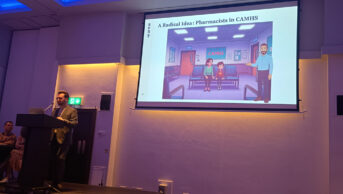
Shutterstock.com
Antipsychotics are being increasingly prescribed for long periods for people with personality disorders and no history of severe mental illness, contrary to UK guidelines, a study published in BMJ Open has found.
An urgent review of clinical practice is warranted to look at the effectiveness of this prescribing and to monitor adverse effects, the study authors concluded.
In the retrospective cohort study, published on 9 March 2022, the researchers analysed data spanning 2000–2016 from 46,210 people registered with participating general practices across the UK who had a record of personality disorders in their notes. Of these, 36,875 did not have a record of severe mental illness.
Overall, 34% (15,562) of all participants had been prescribed antipsychotics at some point and, in the group with no record of severe mental illness, 25% (9,208) had been prescribed antipsychotics.
The researchers also found that the antipsychotics were prescribed for “considerable lengths of time”. The drugs were prescribed for an average of 605 days (median; interquartile range 197–1,639 days).
The authors said this was “potentially concerning” as longer term prescribing of antipsychotics was counter to current UK guidelines from the National Institute for Health and Care Excellence, which does not support routine use of antipsychotics to treat personality disorders because there is limited evidence of their effectiveness.
The data also showed that antipsychotic prescribing had become more common between 2000 and 2016, and prescriptions were most frequently given to women and individuals living in areas with higher levels of deprivation.
Nicola Greenhalgh, lead pharmacist of mental health services at North East London NHS Foundation Trust, described the study findings as “worrying” given that, overall, the evidence of antipsychotic use in personality disorders was “limited”.
However, she said it was important to consider the reasons why patients are treated with antipsychotics in order to develop effective treatments.
“We need to ensure people who don’t work in specialist services have a good understanding of personality disorders to enable them to be able to challenge prescribing and support patients in making informed choices about treatments,” she said.
“Although not covered in this study, it is likely that other treatments, such as benzodiazepines and antidepressants, are also used in a significant proportion of patients without a primary diagnosis of depression or anxiety, but it’s important to also recognise that comorbidities with other psychiatric conditions are high and there can be significant diagnostic uncertainty in patients presenting with psychiatric symptoms who have a personality disorder diagnosis.”
Greenhalgh added that, while psychological therapies remain the treatment of choice for personality disorders, patients may find them difficult to access and at times difficult to engage with, leaving clinicians in a “complex position”.
“Patient risks are often high and therefore there is a need to do something to support the patient to manage their condition and reduce their risks,” she said.
David Taylor, director of pharmacy and pathology at the Maudsley Hospital in London, said prescribing of antipsychotics in personality disorder was “not absolutely contraindicated, and nor should it be”.
“Antipsychotics are a diverse group of drugs with many therapeutic actions apart from their shared antipsychotic activity,” he explained.
“People with personality disorders often endure distress that might be at least partly alleviated by the use of pharmacological treatments, including antipsychotics.
“The degree to which antipsychotics are prescribed in [personality disorders] in the longer term is not surprising.”


